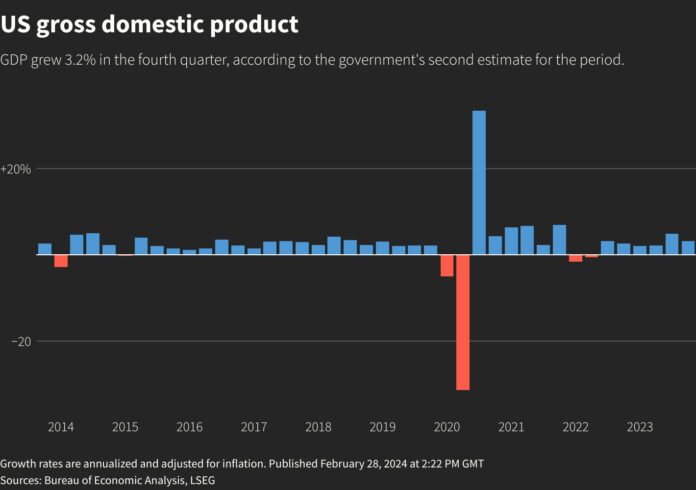
U.S. stocks closed slightly lower on Wednesday, a day ahead of a key inflation reading that could heavily influence expectations for the timing of an interest rate cut from the Federal Reserve.
The personal consumption expenditures (PCE) price index, the Fed’s preferred inflation gauge, is expected to show prices ticked 0.3% higher on a monthly basis in January.
Stocks have struggled to retain upward momentum in recent days leading up to the data after a lengthy rally peaked last week on enthusiasm around the potential for artificial intelligence (AI), fueled by Nvidia’s (NVDA.O), quarterly earnings.
Evidence of stubborn inflation in recent data on consumer and producer prices, a resilient U.S. economy, and commentary from some Fed officials have caused the market to dial back expectations, for the Fed’s first rate cut to June from March.
“Now that those earnings catalysts are behind us in the rearview mirror there could be some softness as now the market has to get its arms around the inflation trajectory and the Federal Reserve’s reaction, whether it’s with rhetoric or a higher-for-longer policy,” said Keith Buchanan, senior portfolio manager at GLOBALT Investments in Atlanta.
“Any embers or symptoms of resurgence in pockets, or in aggregate, of inflation will definitely be taken pretty harshly by the markets.”
The Dow Jones Industrial Average (.DJI), fell 23.39 points, or 0.06%, to 38,949.02, the S&P 500 (.SPX), lost 8.42 points, or 0.17%, to 5,069.76 and the Nasdaq Composite (.IXIC), lost 87.56 points, or 0.55%, to 15,947.74.
Data on Wednesday confirmed the U.S. economy grew at a solid clip in the fourth quarter on strong consumer spending but it appears to have lost some speed early in 2024.
Along with the PCE data, reports for weekly initial jobless claims and manufacturing activity are due this week and will also help gauge the economy’s strength and path of interest rates.
Boston Fed Bank President Susan Collins said on Wednesday the Fed should be “taking time” to assess data before making any policy change in order to be sure to deliver on both of the central bank’s mandates of maximum employment and price stability.
In addition, New York Federal Reserve President John Williams said that even as there is still some distance to cover in achieving the Fed’s 2% inflation target, the door is opening to rate cuts this year depending on how the data come in.
UnitedHealth (UNH.N), fell 2.95% as the biggest drag on the Dow and one of the largest on the S&P 500 after a report on Tuesday said the U.S. Department of Justice had launched an antitrust investigation into the healthcare conglomerate.
Semiconductor equipment supplier Applied Materials (AMAT.O), lost 2.62% on news that it received a subpoena from the U.S. Securities and Exchange Commission in February.
Beyond Meat (BYND.O), shot 30.72% higher as the plant-based meat maker placed its bets on price hikes and steep cost cuts to turn around its battered margins, triggering a squeeze on its highly shorted shares.
Major cryptocurrency firms Coinbase Global (COIN.O), advanced 0.7% and peer Marathon Digital (MARA.O), closed 2.38% higher but both ended well off their earlier highs as bitcoin surged to nearly $64,000 before paring gains.
Declining issues outnumbered advancers by a 1.21-to-1 ratio on the NYSE while on the Nasdaq, declining issues outnumbered advancers by a 1.72-to-1 ratio.
The S&P 500 posted 67 new 52-week highs and one new low. The Nasdaq recorded 173 new highs and 95 new lows.














